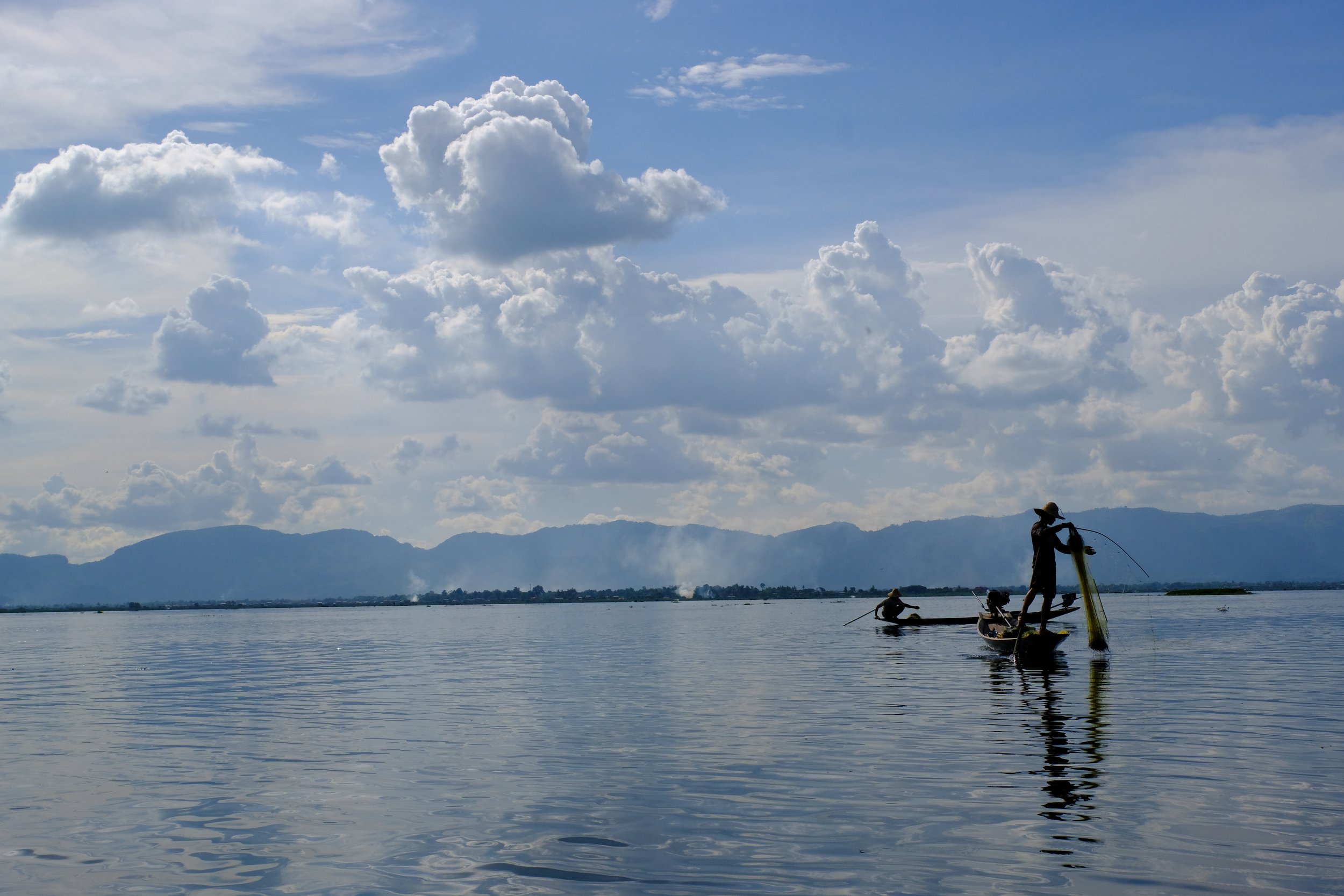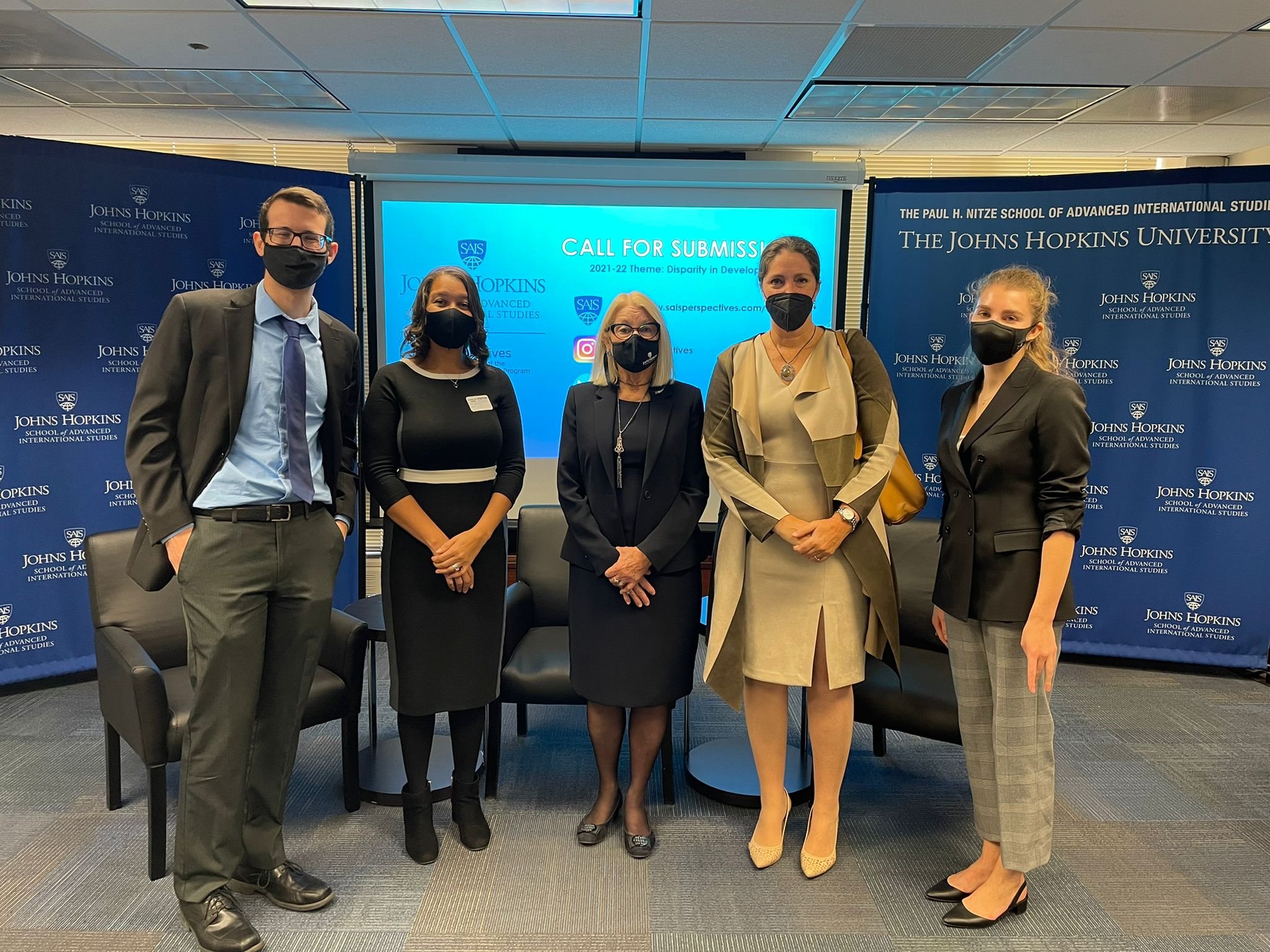To celebrate the annual launch of their publication theme, SAIS Perspectives invited experienced professionals and experts to speak as panelists on the 2021-2022 theme of “Disparity in Development.” Two panel discussions were hosted, with the first taking place at the SAIS campus in Washington D.C. and the second at the SAIS Europe campus in Bologna, Italy. Questions for the panelists were submitted by SAIS students prior to the event and provided the ground for a constructive conversation on key issues of disparity that have persisted and become increasingly prevalent following the global COVID-19 pandemic. Both panels were centered around a common topic, yet the array of themes and emphases that emerged during the conversations was wide-ranging, reflecting not only the diversity in the background of the speakers in attendance but also in the sub-fields of international development where disparity remains a relevant and imperative subject.
The SAIS Perspectives launch-event series kick-started on November 10, 2021 at the SAIS DC campus with the participation of Wendy Teleki, Head of the Women Entrepreneurs Finance Initiative (We-Fi Secretariat) at the World Bank, and Alicia Robinson-Morgan, Managing Director for Africa at the Millennium Challenge Corporation (MCC). Joining the two panelists as moderator was Professor Cinnamon Dornsife. Collaborative efforts and gender inclusion were the two themes that prevailed throughout the conversation. Ms. Robinson-Morgan, who opened the panel, pointed to the importance of inclusion and collaboration in approaches to development as she explained how the MCC has framed much of its development efforts around country-led implementation and private sector-led engagement. In discussing her work, Ms. Robinson-Morgan highlighted gender, infrastructure, and government capacity gaps as prevalent challenges that continue to demand attention and response.
In concurrence with Ms. Robinson-Morgan’s remarks, Ms. Teleki emphasized how gender has become a central focus at the World Bank and other multilateral development banks, both in direct programming for female-empowerment initiatives and in mainstreaming gender as a key analytical lens for development work in emerging markets. Her work at the We-Fi Secretariat, which focuses on supporting female entrepreneurs, reveals a significant gap in the level of entrepreneurship between men and women, in terms of not only start-up initiatives but also profitability and growth expectations. Ms. Teleki argued that initiatives for promoting female entrepreneurship need to ensure that entrepreneurship efforts extend beyond subsistence goals and support the integration of these start-ups into the global economy.
Following their launch event in Washington D.C, SAIS Perspectives collaborated with BIPR to welcome Jyotsna Puri, Associate Vice President of the Strategy and Knowledge Department at International Fund for Agricultural Development (IFAD), and Onno Ruhl, General Manager of Aga Khan Agency for Habitat, to their panel at the SAIS Europe campus. The discussion was moderated by Director Michael Plummer and drew attention to the subject of climate change, particularly the response and funding to various climate- and sustainability-related initiatives.
Dr. Puri began with the argument that the international development community must do more to intervene on behalf of those who have been most affected and threatened by climate change. In particular, Dr. Puri focused on the disparity of funding between climate mitigation and climate adaptation initiatives. As Dr. Puri explains, of the $580 billion that was invested in climate funding in 2017-2018, for every $18 of climate finance invested in mitigation efforts, only $1 has been invested in adaptation efforts to help communities experiencing and/or are likely to experience negative climate-change impacts. According to Dr. Puri, this gap in climate finance should not be considered a “market failure” but instead a “policy failure,” as governments can appropriately incentivize investments in climate adaptation projects. With better climate adaptation, the world can become more resilient overall to climate change and respond more effectively to the needs of those most often disregarded by development policy.
Building upon Dr. Puri’s discussion of funding disparities in climate finance, Onno Ruhl emphasized the urgency of climate adaptation interventions for vulnerable communities. Explaining his work at the Aga Khan Agency for Habitat, Mr. Ruhl articulated how disparity in climate adaptation funding can affect Europe’s future. In one example, Ruhl described how residents of small villages in the mountainous Northern regions of Pakistan often have no choice but to move to the slums of Karachi or other impoverished urban areas if their communities are destroyed by climate disasters. Continuing his example, Ruhl argued that in Karachi, a coastal city threatened by sea level rise, a mass migration of regional dwellers would only exacerbate population crowding issues. The repetition of community destruction and urban resettlement over time would likely trigger climate migration crises, with as many as 200 million individuals affected around the world in coming years. Thus, as Ruhl illustrates, disparities in awareness and funding throughout development programs are likely to have long-term consequences on the lives of both those immediately affected and apathetic bystanders. By redirecting their focus and correcting such inequalities, policymakers can shape a more just and equitable future for the world and its inhabitants.
SAIS Perspectives also announced the winners of its 2021 Photo Contest at the panel event. SAIS alumnus Chris Joondeph received the first place title for his entry entitled “Cannonball Comoros.” SAIS student Simone Weichenrieder received the second-place prize for her entry entitled “Rituals.” Links to the winning photos can be found here on the SAIS Perspectives website.
We encourage all of those who are curious about submitting to this year’s theme to visit this page for more information, or to send us an email at sais.perspectives@gmail.com.





